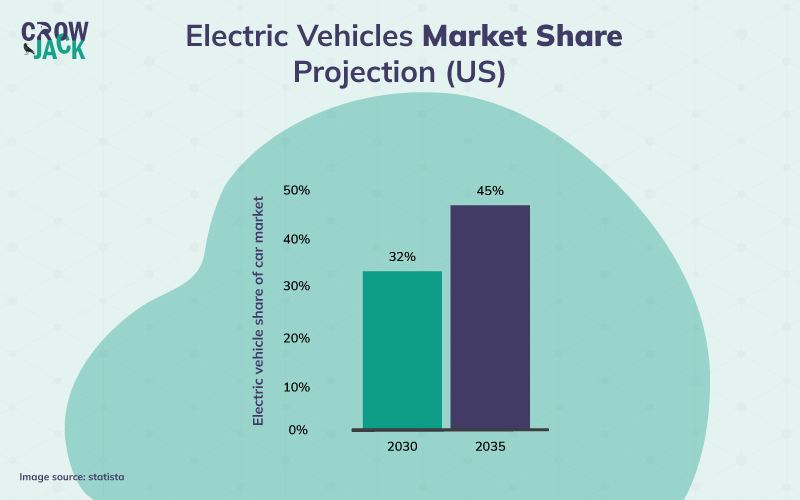Tesla Overview
Tesla is a renowned manufacturer of electric vehicles. The company is based in the US and has been in operation since 2003. Tesla is headed by one of the top entrepreneurs and philanthropists in the world, Elon Musk who definitely does not need any introduction. Tesla has its operations in around 40 countries and its workforce comprises 99,290 employees the company earned a revenue of $53,823 million in 2021. Further, Tesla External Analysis will look into how external business factors affect the company’s operations and strategic goals.
Speaking of the company’s vision, it aims to accelerate the world’s transition to sustainable energy. To achieve its vision, the company has launched various innovative products such as vehicles that run on long-lasting batteries. Further, the company is revolutionizing the housing industry as well by providing the people an option to install a solar roof that is much more affordable compared to the solar panels offered by other companies.
Table of Contents
PESTLE Analysis is one of the important tools to analyze the external environment that can impact the industry. This article would analyze the impact of the political, economic, social, technological, legal as well as environmental factors that can have an impact on the electric vehicle industry with respect to Tesla External Analysis. This Tesla PESTLE analysis would prove to be beneficial for the automotive companies to formulate strategies for efficient operations in the US as well as the UK.
TESLA PESTLE Analysis: A Critical Assessment of Facts
Political factors affecting Tesla
The US has a robust political environment with great opportunities for businesses to exploit. Besides, the US has free trade agreements and technology exchange partnerships with many countries. Hence, for automotive manufacturers based in the US, this is a huge plus point. The federal government of the US has announced funding of $7.5 billion to assist the companies in establishing the EV infrastructure (Graig, 2022). This assistance can boost the operations of the companies engaged in the manufacturing of EVs. Further, EV companies are highly dependent on semiconductor chips and their shortage in the market due to COVID and reduction in the supply of neon supplies from Ukraine which is an essential element for producing semiconductor chips can disrupt the production of the companies.
Moving forward, the United Kingdom also has a stable political environment however, there are some disruptions in the trade and commerce environment after Brexit. The government of the UK is planning to ban vehicles that run on red diesel and biofuels. This means that the companies would have to mandatorily shift towards sustainable engines (Jain, 2021).
Economic factors affecting Tesla
The US economy is the best performing economy among the top economies of the world. The US economy is expected to experience a downfall compared to the 2021 levels. The growth in 2021 was 5.7% and in 2022 and 2023 it is expected to slower to 4% and 2.6% respectively (IMF, 2021). But, the rate of people becoming jobless would lower to 5.7% in 2022 compared to 6.3% in 2021 (UN, 2021). More employed people signify an increase in competition among the companies to attract employees which would ultimately have a negative impact on the industry as the companies would have to pay more salaries to employees in order to recruit and retain them. Likewise, inflation is at a record high and it reached 7.5% in 2021. The high inflation would increase the cost of output because of an increase in the prices of raw materials which would ultimately lead to an increase in the prices of the final products. Therefore, the sales of the companies would drop as the level of affordability would decrease.
Speaking of the industry growth rate, the EV market in the US is worth $287.36 billion and it is projected to grow at a CAGR of 24.3% from 2021-to 2028 to reach $1318.22 billion.

Further, the growth rate of the UK for 2021 was 7.5% (UK Government, 2021). It is expected to fall sharply to 3.6% in 2022 and 1.3% in 2023 (British Chamber of Commerce, 2022). The per capita income of the UK in 2021 was 32,514 pounds and is expected to rise to 41900 pounds in 2022 and further to 46700 pounds in 2023. The rise in per capita income would lead to an increase in expenditure and consumption, thereby resulting in an increase in sales of the companies.
Social factors affecting Tesla
The companies dealing in EV vehicles have a potential opportunity to exploit the US market where more people are shifting towards electric vehicles as they are more sustainable, approximately 39% of customers would consider EV as the next option. The major concern for the companies is producing efficient vehicles as around 15-20% of people prefer vehicles that have enhanced features along with full safety (SPENCER & Funk, 2021). In the US, people are now genuinely interested in good substitutes for vehicles that run on petrol and diesel given the sharply rising costs of fuel. Also, people are now embracing modern lifestyles and the youngsters are now quite interested in premium and luxury brands which is a positive sign for the industry. Moreover, people are now also expecting enhanced safety features from car companies for better safety in times of fatal crashes. Moreover, people now have a greater preference for automatic transmission vehicles. As per Statista, the demand for automatic transmission cars is constantly increasing hinting at a major shift in the industry.
Further, another key social trend is that customers are more respectful of organizations that embrace diverse and inclusive work cultures rather than organizations that have lack of diversity.
Further, in the UK more than 69% of car owners would shift towards electric vehicles from the current combustion fuel vehicles to cut their expenses as a result of rising fuel prices. This presents a significant opportunity for EV companies to market aggressively (Crider, 2022). In the UK, contrary to Americans, people have a greater preference for manual transmission cars.
Technological factors affecting Tesla
The US government spends the highest on Research and Development in the world. It spent $157 billion in 2021 and the expenditure for 2022 is estimated to be $171 billion while the UK Government spent 14.9 billion euros in 2021. Further, various emerging technologies that are revolutionizing the EV industry include wireless charging networks wherein the vehicles can get automatically charged while in stationary mode and there is no requirement of a cable to connect the charger. Furthermore, many companies have launched ultra-fast chargers wherein the vehicle can get charged in just 15 minutes and the new graphene-based charger is being experimented with by many players in the industry that would cut the charging time to 15-20 seconds. In addition, the concept of solar-powered electric cars is in the testing phase. Furthermore, NanoBolt lithium tungsten batteries, zinc manganese oxide batteries, and gold nanowire gel electrolyte batteries are among the latest battery technologies in the EV industry. However, at the same time, companies need to ensure that there is no exploitation of technology by workers and other stakeholders.
Legal factors affecting Tesla
The agency responsible for governing the auto industry in the US is The National Highway Traffic Safety Administration. This agency formulates policies and standards for the vehicle manufacturers related to designing, constructing, and operating vehicles in accordance with the National Traffic and Motor Vehicle Safety Act. Further, the federal government recently passed the Bipartisan Infrastructure Bill wherein it is compulsory for companies to install the forward-collision warning system, automatic emergency braking, and lane-keeping assistance technology (Lowells, 2021). These requirements would increase the prices of cars.
Furthermore, the government in the UK has made it mandatory for companies to install the intelligent speed assistance system in their vehicles from 2022 itself. The installation of additional technology would lead to an increase in the prices of the vehicles which can have a negative impact on sales. Additionally, the EV companies are provided an innovative environment and the government has recently launched the Intellectual Grant Property Scheme wherein the companies are offered financial assistance for various services such as management of intellectual property assets, commercialization of intellectual property, and paying the fees for IP related services in the UK and abroad as well (Naidu, 2021).
Environmental factors affecting Tesla
The scrapped batteries from the EVs end up in a landfill, thus leading to pollution. Moreover, the batteries that do not get disposed of or recycled properly produce toxic chemicals that result in severe diseases such as cancer and other neurological disorders in the community. In the US, 27 states have enacted e-waste regulations wherein the companies are required to meet the target related to recycling of the products, for example in Indiana 60% of e-waste should compulsory be recycled and if the companies fail to meet the target, they would be fined based on the shortfall (McCrea, 2019).
Further, the federal government of the UK has announced a ban on sales of combustion engine vehicles from 2030 and only emission-free vehicles would be allowed to sell. This rule can lead to positive results for EV companies. (Randall, 2021).
Also, both UK and the US are parties to the Paris Agreement and will have to abide by the international commitments of the agreement. Subsequently, stricter actions against climate change will reflect in the environmental policies in both nations.
To encapsulate, the political environment in both the US and UK is favorable for EV companies. The US government is offering financial assistance to boost the business whereas the German government’s plan to ban the vehicles that run on combustion fuels offers a great opportunity for the EV companies. The high inflation in the US can be a barrier as the prices would rise which can have an impact on the sales of the vehicles for some time. Further, the rise in prices of crude and more awareness among the customers for sustainable vehicles can be positive news for the EV companies. Furthermore, the companies can take advantage of the new emerging technologies to enhance their efficiency. The negative aspect of the EV industry is the generation of e-waste from scrapped batteries. These batteries should be recycled in an effective way to reduce the impact on the environment. Besides TESLA external analysis, if you wish to analyze the internal capabilities of the company, you can go through our elaborate SWOT Analysis of Tesla.
Recommended Readings
References
Crider, J. (2022). UK Drivers Cut Fuel Costs 69% Switching To EVs From Petrol/Diesel Cars. cleantechnica.com. Retrieved 29 March 2022, from https://cleantechnica.com/2022/02/04/uk-drivers-cut-fuel-costs-69-switching-to-evs-from-petrol-diesel-cars/
Driivz. (2020). Five Innovations Herald Easier and Faster EV Charging Future. driivz.com. Retrieved 29 March 2022, from https://driivz.com/blog/ev-charging-technology-innovations/
Lovells, H. (2021). Bipartisan Infrastructure Bill includes new safety mandates for auto industry. www.jdsupra.com. Retrieved 29 March 2022, from https://www.jdsupra.com/legalnews/bipartisan-infrastructure-bill-includes-3175735/
McCrea, B. (2019). The Evolution of E-Waste Laws and Regulations. /www.sourcetoday.com. Retrieved 29 March 2022, from https://www.sourcetoday.com/industries/article/21867326/the-evolution-of-ewaste-laws-and-regulations.
Race, M. (2021). New homes in England to have electric car chargers by law. www.bbc.com. Retrieved 29 March 2022, from https://www.bbc.com/news/business-59369715
Randall, C. (2021). UK announces new EV regulations with Net Zero Strategy. /www.electrive.com. Retrieved 29 March 2022, from https://www.electrive.com/2021/10/20/uk-announces-new-ev-regulations-with-net-zero-strategy/.
SPENCER, A., & Funk, C. (2021). Electric vehicles get mixed reception from American consumers. /www.pewresearch.org. Retrieved 29 March 2022, from https://www.pewresearch.org/fact-tank/2021/06/03/electric-vehicles-get-mixed-reception-from-american-consumers/.

 Proof Reading
Proof Reading  Copy Writing
Copy Writing  Resume Writing
Resume Writing  Blogs
Blogs Guides
Guides SOP's
SOP's Student Resources
Student Resources Research Topics
Research Topics Login
Login Register
Register



